A Jeep Wrangler can overheat due to factors like a faulty thermostat, low coolant levels, a malfunctioning radiator fan, or a clogged radiator. Regular maintenance and addressing these issues promptly can help prevent overheating problems in your Jeep Wrangler.
Jeep Wranglers are known for their ruggedness and off-road capabilities. However, like any vehicle, they are not immune to the issue of overheating. If you’ve ever found yourself asking, “Why is my Jeep Wrangler overheating?” then this article is for you.
We’ll explore the common causes, signs, and preventive measures to keep your beloved Jeep running smoothly.
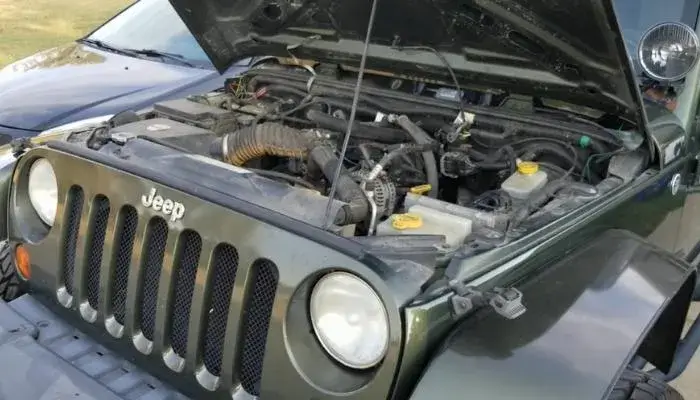
Jeep Wrangler Overheating
Jeep Wrangler overheating occurs when the engine’s temperature rises beyond normal levels. Several factors can cause this, and addressing the issue promptly is crucial to avoid further damage.
Common Causes of Jeep Wrangler Overheating
1. Low Coolant Levels
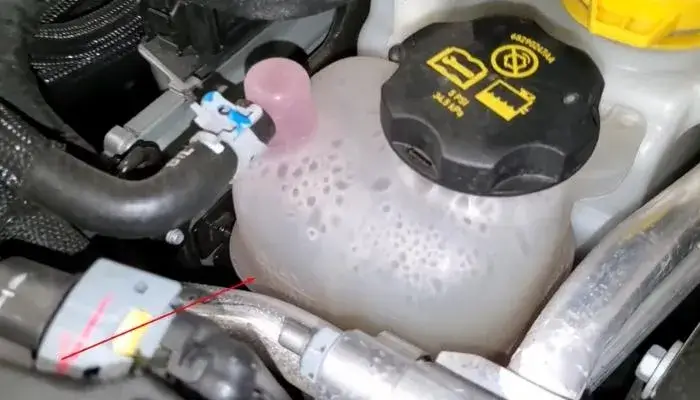
Low coolant levels are one of the most common culprits of Jeep Wrangler overheating. Insufficient coolant can’t effectively regulate engine temperature, leading to overheating. Ensure your coolant reservoir is filled to the recommended level.
2. Faulty Cooling Fan
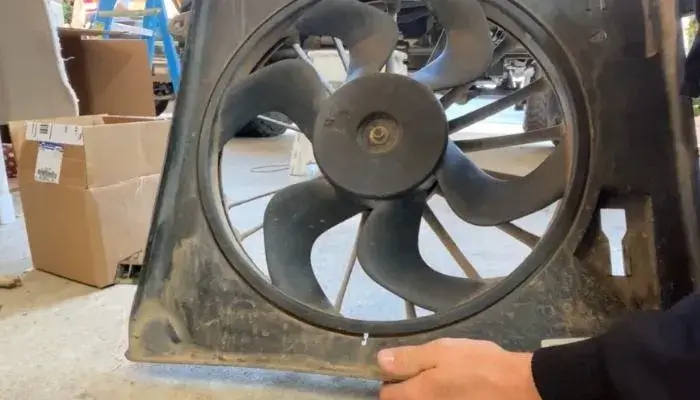
The cooling fan plays a crucial role in maintaining a safe engine temperature. A malfunctioning fan can result in overheating, especially in slow-moving traffic or off-road conditions. Check the fan’s operation and replace it if necessary.
3. Thermostat Issues
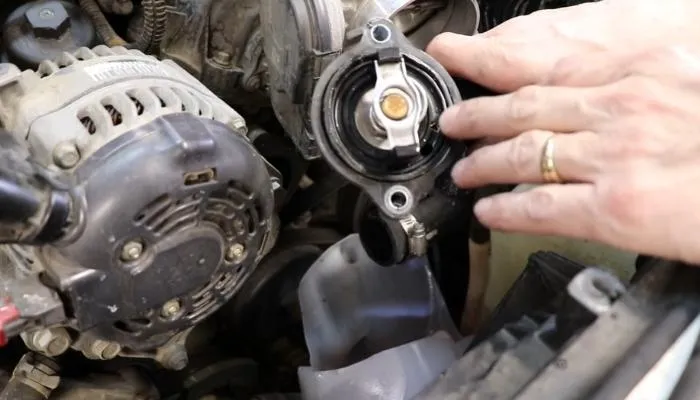
A malfunctioning thermostat can get stuck in the closed position, preventing coolant flow. This can quickly lead to overheating. Have your thermostat inspected and replaced if needed.
4. Radiator Blockages
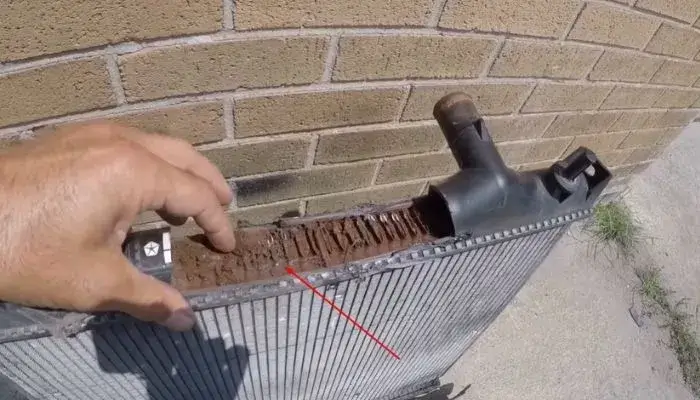
Over time, debris and sediment can accumulate in your radiator, hindering its cooling efficiency. Regularly flush and clean your radiator to prevent overheating issues.
5. Water Pump Problems
The water pump is responsible for circulating coolant throughout the engine. If it fails, your Jeep Wrangler is at risk of overheating. Be sure to have the water pump inspected and replaced if necessary.
Other causes are following:
- Engine Oil Problems: Inadequate or dirty engine oil can’t lubricate and cool the engine properly, leading to overheating.
- Clogged Air Filter: An air filter clogged with dirt and debris restricts airflow to the engine, causing it to overheat.
- Faulty Belts and Hoses: Cracked or loose belts and hoses can lead to problems with the cooling system, contributing to overheating.
- Driving Conditions: Extreme heat, towing heavy loads, or off-roading in challenging terrains can put extra stress on your Jeep’s engine, increasing the risk of overheating.
What to Do When Your Jeep Overheats
Immediate Actions
If your Jeep is overheating, pull over to a safe location immediately. Continuing to drive can cause severe damage to the engine.
Checking Coolant Levels
Open the hood and check the coolant level in the reservoir. If it’s low, add coolant as needed. It’s essential to ensure that you’re using the right coolant mixture recommended for your Jeep model.
Inspecting the Radiator Cap
The radiator cap plays a vital role in maintaining pressure within the cooling system. A damaged cap can cause overheating. Inspect it for any issues.
Examining the Thermostat
A faulty thermostat can be a culprit. Have it checked and replaced if necessary.
Assessing the Cooling Fan
Make sure the cooling fan is functioning correctly. If it’s not, it may need repairs or replacement.
Verifying the Water Pump
Check the water pump for any leaks or issues. A failing water pump can lead to insufficient coolant circulation.
Preventing Jeep Wrangler Overheating
To ensure your Jeep Wrangler remains cool and reliable, consider the following preventive maintenance tips:
Regular Maintenance: Ensure your Jeep receives routine maintenance, including coolant level checks, thermostat inspections, and radiator flushes.
Check the Cooling Fan: Regularly inspect the cooling fan for signs of wear and tear. Listen for unusual noises and ensure it engages when the engine gets hot.
Radiator Maintenance: Clean your radiator regularly to prevent blockages. Consider using a radiator flush to remove built-up sediment.
Water Pump Care: Inspect the water pump for leaks or unusual sounds. Replace it if you notice any issues to avoid overheating.
Oil Change: Stick to a regular oil change schedule, and use the recommended oil for your Jeep Wrangler.
Change Air Filters: Replace air filters as your vehicle’s manual recommends.
Drive Sensibly: When off-roading or towing, drive sensibly and avoid pushing your Jeep to its limits in extreme conditions.
Jeep Wrangler Overheating at Highway Speeds
If your Jeep Wrangler is overheating at highway speeds, there are a few potential causes. The most common cause is a lack of airflow through the radiator. A dirty or blocked radiator, a stuck thermostat, or a problem with the cooling fans can cause this.
If your Jeep has an automatic transmission, it may also be overheating due to a slipping torque converter clutch. Other potential causes of overheating include low coolant levels, leaks in the cooling system, and worn-out water pump bearings.
Jeep Wrangler Overheating With Ac on
If you have a Jeep Wrangler, you may have experienced overheating when using the air conditioning. This can be a problem on hot days, especially if you are stuck in traffic.
Several things can cause your Jeep to overheat with the AC on, and we’ll go over some of those here.
One issue could be that your coolant level is low. The coolant helps keep your engine cool, so if it’s low, it can’t do its job either. Check the coolant level and add more if needed.
Another possibility is that something could block the airflow to your radiator. This could be leaves or other debris, so make sure to check and clean off anything that could be blocking airflow.
The fan for your radiator might also not be working properly. The fan helps to circulate air through the radiator so it can do its job of cooling down the engine. If the fan isn’t working right, it won’t be able to circulate air and your engine will overheat. You may need to replace the fan if it’s not working properly.
There are other potential causes of overheating, but these are some of the most common ones. If you’re having trouble with your Jeep overheating, take it to a mechanic to check it out and determine what might be causing it.
Jeep 4.0 Overheating Problems
If you own a Jeep Wrangler with a 4.0L engine, you may have experienced overheating problems. The good news is that there are some things you can do to fix the problem.
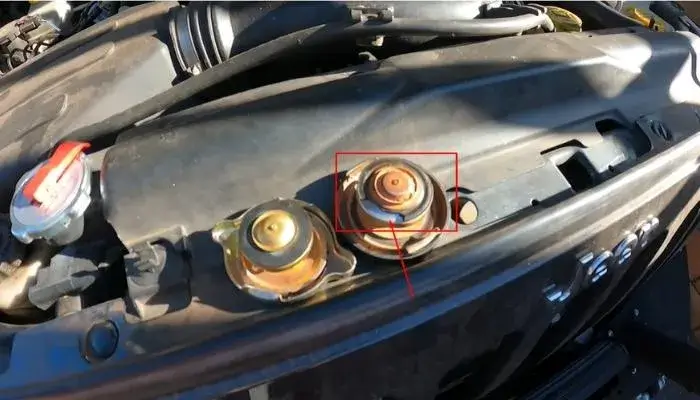
- The first thing you should check is the radiator cap. The pressure in the radiator must be released before removing the cap. Once the pressure is released, unscrew the cap and check the coolant level in the radiator. If it’s low, add more coolant until it reaches the “full” line on the side of the radiator.
- Next, check all the hoses connected to your Jeep’s cooling system for leaks or cracks. If any are damaged, replace them with new ones.
- Finally, make sure that your Jeep’s thermostat is working properly. The thermostat regulates the flow of coolant through your engine, and if it’s not working correctly, it can cause your Jeep to overheat.
To test it, start your Jeep’s engine and let it idle for a few minutes. Then feel around the upper and lower radiator hoses – they should be about equal temperature.
Jeep Overheating But Has Coolant
If your Jeep is overheating but has coolant, there are a few things you can check to try and fix the issue.
- First, make sure that the radiator cap is tight and not leaking. If it is leaking, you may need to replace the gasket or the entire cap.
- Next, check the coolant level and add more if necessary.
- Finally, check for any leaks in the cooling system and repair as needed.
Jeep Overheating Troubleshooting
If your Jeep is overheating, there are a few things you can do to troubleshoot the issue.
- First, check the radiator fluid level and make sure it is full. If it is low, add more fluid and see if that fixes the problem. If the fluid level is fine, check the radiator hoses to see if they leak or need replacement.
- Next, check the thermostat to see if it is stuck open or needs to be replaced.
- Finally, check the water pump to see if it is working properly.
If all of these things seem to be in working order, you may have a bigger problem and need to take your Jeep to a mechanic for further diagnosis.
How Do I Stop My Jeep from Overheating?
If your Jeep is overheating, there are a few things you can do to try and fix the problem.
First, check the coolant level and make sure it is full. If it is low, add more coolant and see if that helps. If the coolant level is fine, check the radiator for leaks. If there are any leaks, you must repair or replace the radiator.
Another thing you can try is to flush the cooling system and refill it with fresh coolant. This will help remove any build-up that may be causing problems.
Finally, if none of these solutions work, you may need to take your Jeep to a mechanic for further diagnosis.
What are 8 Common Causes of Overheating?
There are a variety of things that can cause a car to overheat. Here are ten of the most common causes:
- Low coolant levels: If there isn’t enough coolant in the system, it can’t do its job and the engine will overheat. Make sure to check your coolant levels regularly and top them off if necessary.
- Leaks: A leak in the cooling system can also lead to overheating. Check for any leaks and repair them as soon as possible.
- Old coolant: Coolant breaks down over time and becomes less effective at doing its job. Flush the system and add fresh coolant according to your manufacturer’s recommendations.
- Radiator issues: A clogged radiator, dirty radiator fins, or a damaged radiator can all impede heat transfer and cause overheating. Clean or replace your radiator as needed.
- Fan problems: The fan is responsible for drawing air through the radiator to help keep things cool. If the fan isn’t working properly, overheating can occur.
- Thermostat issues: The thermostat helps regulate how much coolant flows through the engine block by opening and closing as needed.
- Water pump issues: The water pump circulates coolant throughout the system.
- Improper oil level: Too much or too little oil can cause serious problems.
How Do I Know If My Thermostat is Bad on My Jeep Wrangler?
If your Jeep Wrangler’s thermostat is bad, you’ll likely see one or more of the following symptoms:
- The engine is overheating. This is the most common symptom of a bad thermostat. If your engine temperature gauge starts climbing higher than normal or the needle enters the red zone, it indicates that your thermostat may be stuck in the open position and needs to be replaced.
- The engine is not warming up properly. If it takes an unusually long time for your engine to reach operating temperature, or if the temperature never seems to get high enough, it could be due to a failing thermostat.
- The heater isn’t working correctly. If your jeep heater blows cold air when it should be blowing hot air, the problem may lie with your thermostat. In this case, it’s likely that the thermostat is stuck in the closed position and needs to be replaced.
If you notice any of these symptoms, having your Jeep Wrangler’s thermostat checked by a qualified mechanic as soon as possible is important.
How Do I Know If My Jeep Wrangler Water Pump is Bad?
If your Jeep Wrangler has issues with the water pump, there are a few ways to tell.
One way is to check the coolant level in the radiator. If it’s low, that could be a sign that the water pump isn’t working properly.
Another way to tell is by listening for noise from the water pump area when the engine is running. Having the water pump checked out is a good idea if you hear any abnormal noise.
Finally, if your Jeep overheats frequently or the temperature gauge reads higher than normal, that could also indicate a problem with the water pump.
Jeep Overheating Issue Solved
Wrapping Up
The Jeep Wrangler is a popular vehicle but not without problems. One of the most common complaints is that it overheats. There are a few possible reasons for this, but the most likely is that the radiator isn’t big enough for the engine.
The engine produces a lot of heat, and the radiator needs to dissipate that heat quickly. If it can’t, then the engine will overheat. Another possibility is that something is blocking the airflow through the radiator, preventing it from cooling properly.
Whatever the cause, if your Jeep Wrangler is overheating, it’s important to get it fixed as soon as possible to avoid damage to the engine.
FAQs on Why is My Jeep Wrangler Overheating
Can I drive my Jeep Wrangler if it’s overheating?
It’s not advisable to drive an overheating Jeep. Pull over, turn off the engine, and let it cool down before seeking assistance.
How often should I check my coolant level?
Check your coolant level at least once a month and before long trips. Top it up if necessary.
What should I do if my Jeep overheats in the middle of nowhere?
Turn off the engine, open the hood to help it cool faster, and call for assistance. Avoid opening the radiator cap while the engine is hot.
Is Jeep Wrangler overheating a common issue?
It can happen, especially if maintenance is neglected or if the vehicle is subjected to extreme conditions. Regular upkeep can prevent most overheating problems.
Can I use water instead of coolant in an emergency?
Water can temporarily cool the engine, but long-term use is not recommended. Coolant has additives that protect your engine from corrosion and freezing.
Are there any aftermarket cooling solutions for Jeep Wranglers?
You can explore aftermarket options like high-performance radiators and cooling fans to enhance your Jeep’s cooling system.

